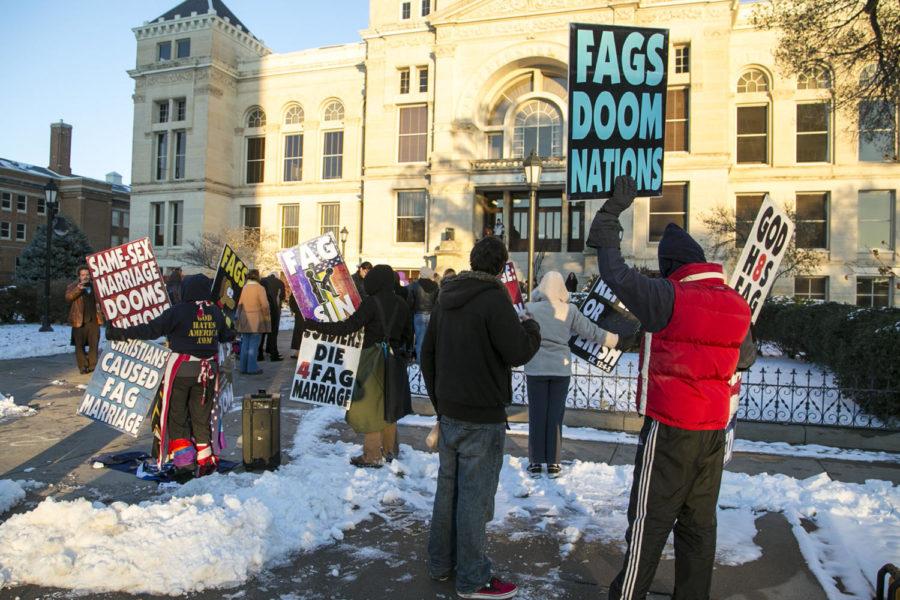It only takes reading a few sentences into the “about” page on the Westboro Baptist Church’s website to understand one thing: this is a group fueled by hate.
The WBC is well known for its protesting tactics, picketing at events from military funerals, such as Sgt. Dillon Baldridge’s in North Carolina in June, to memorials for school shootings, including one after the 2012 Sandy Hook Elementary School shooting in Connecticut. The group’s next protest is slated for today, Oct. 5 — church members will be on the University of Pittsburgh campus after making an appearance at Carnegie Mellon University, concluding with a protest downtown at Duquesne.
Many groups from the Oakland area and throughout the city are organizing counter protests, such as the Trans Liberation protest organized by SisTers PGH on Carnegie Mellon’s campus. Pitt’s Student Government Board is partnering with Rainbow Alliance to hold “Panthers Unite Against Hate,” a fundraiser for Proud Haven. The group works with homeless LGBTQ+ youth and is hoping to raise $20 every minute WBC is on campus. Another group, known as “Christianity is not Westboro Baptist Church,” has also organized counter protests at CMU, Pitt, Duquesne, Central Catholic and Oakland High School.
Waving signs or participating in a march or a sit-in are unquestionably effective and responsible ways to acknowledge your disapproval of bigotry. But by making the bigots themselves the object of your animosity rather than their beliefs and actions, you could open the door to violent encounters.
One such instance is the 2016 brawl between WBC protesters and students at a Los Angeles high school. The WBC came to voice its disapproval of the school’s newly installed gender-neutral bathroom. Several students confronted picketers, inciting violence by beginning to throw objects at them, although no one was seriously injured.
As students at a University that has a past of passionate, violent protesting — such as the 2016 post-election demonstration in Litchfield Towers — we should take this as an example of what can happen in confrontation with the WBC and strive for more effective, peaceful protesting methods. Riotous environments, on the other hand, where the WBC uses hateful rhetoric only to further its own message, potentially puts counter protesters in physical danger.
More recently, Pitt students led a counter protest on the patio outside Litchfield Towers against a small bigoted crowd last month. And at the Cato vs. Heritage debate sponsored by Pitt’s College Republicans Sept. 21, police had to escort several student protesters from the scene. While the first was a good example of a nonviolent demonstration, if students at the debate really wanted to make their voices heard and understood, they would’ve been more effective engaging in open, respective dialogue.
To find an example of such dialogue, it’s best to look at two groups whose ideologies often fall on different sides of the spectrum, but can unite in their commitment to tolerance — Pitt’s College Democrats and Republicans. President of College Republicans at Pitt, Marlo Safi, is ready to bridge that gap.
“There are misconceptions about the opposing ideology [of conservatives and liberals] on both sides,” Safi said. “It’s comforting to know that ultimately, there is a consensus between students that bigotry is intolerable.”
Safi’s equivalent in the College Democrats, Charlotte Goldbach, agreed that students of all persuasions should be able to work together in the face of hatred.
“Peaceful counter protests are already planned, organized by students to local activists,” she said. “I know that students will unite against the hatred and bigotry.”
If the WBC continues its past practices, the hate group will likely target members of the LGBTQ+ community. Kate Shindle, president of Pitt Rainbow Alliance, a student organization that hosts events for LGBTQ+ students and allies, said that there are many acceptable ways to respond to hate.
“We want to encourage Pitt students to think about what kind of response is the most meaningful to them,” Shindle said. “Protesting, especially in such a toxic environment, is not healthy and accessible for everyone.”
Shindle also mentioned that for anyone looking for a safe place today, the Rainbow Alliance office in room 611 of the William Pitt Student Union will be open from 11 a.m. to 7 p.m. The group will also join with CMU Allies at 5 p.m. to host a self-care focused event in Schenley Plaza, designed to counter the harmful messages spread throughout the day.
“Regardless of what you plan to do,” Shindle said, “please remain nonviolent.”
In a “Christianity”-affiliated protest like today’s, peace is especially crucial in counter protesting because it’s how true followers of the religion would and should react.
WBC will do everything it can to pass itself off to college students as the true representative of Christianity. But as a Christian, I am deeply troubled by their complete misrepresentation of what my religion is. The WBC is quick to use the Bible to shout God’s hatred for various people and groups. But reading even a few lines of God’s word in the Bible plainly shows how misguided this message is.
John 3:16 is perhaps the most famous example: “For God so loved the world that he gave his one and only Son, that whoever believes in him shall not perish but have eternal life.”
This verse single-handedly shuts down the WBC’s entire “theology.” Christianity hinges entirely on the redeeming power of God’s love, something Safi agrees the WBC isn’t cultivating.
“As a devout Christian, I […] pray for God to have mercy on the souls of anyone who makes the patently false claim that God hates any of his children,” she said.
There is a fundamental difference between hating someone’s actions and the person themselves. Let’s take the opportunity today to live out that distinction not by tearing down the WBC, but showing them with our words and actions that love is — and always will be — more powerful than hatred.
Marlo Safi used to be a writer and editor at The Pitt News.
Write to Sarah at [email protected].


